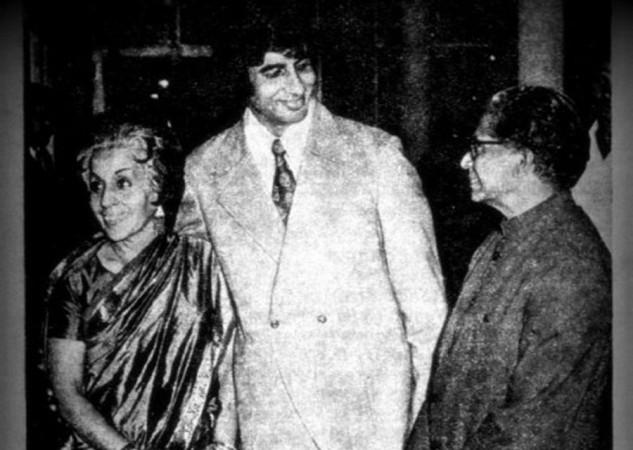
Amitabh Bachchan is apparently very furious as he might lose his exclusive copyright of his father Harivansh Rai Bachchan's literary works 60 years after the latter's death as per the Copyright Act, 1957. In general, the literary and artistic works would cease to come under the purview of copyrights laws 60 years after the death of the author or artist.
Harivansh Rai Bachchan, a renowned poet, died at the age of 95 on January 18, 2003, due to chronic respiratory ailments.
Amitabh Bachchan often recites his fathers work be it on Twitter or at any public event. The 75-year-old actor, who loves to quote from his father's poems be it on Twitter or at a public event, took to his blog to vent out his anger and wrote, "Copyright .. !! written copyright and whatever else in the realm , lives 60 years after the passing with the elements of them that be the rightful उत्तराधिकारी..really ..? so who designed 60 years ? why 60 why not 61 , or why not perpetuity !! (sic)"
Here's the full text of the blog post:
"I believe it initiated in 1957 or so .. and am angered by its audacity! So what gets left as natural heir by Father Dr Harivansh Rai Bachchan, after his passing passed 60 years, belongs no longer to his domain or possessive copyright as willed .. but becomes for the entire Universe to tread, scratch, mutilate, use in commercial consideration on their own creative discretion .. ???
RUBBISH .. ! I OPPOSE, DISAGREE, LAMENT, DISPUTE, BE IN VARIANCE OF, IN VEHEMENT LOUD SCREAMS OF VOICE .. EVER."
He further added, "My inheritance be mine .. not another's after the passing of its stipulated time in years .. 60 .. i am genetically my Father's son .. he be willed to me of all that be in asset of his .. his writings be his .. his heir be me .. his writings be mine .. MINE ! i shall not and will not allow its dilution to general public ..
I bring my inherited aesthetics to its creativity .. it may be the worst ever .. but it is my copyright .. another after the passage of the time recorded will use and design and perform and monetise and make diversions to it at will ..
BECAUSE .. it now belongs to the public ..????
NEVER NEVER NEVER .. !!!!"
He further argued, "My and mine of family will and shall and must have its creative consent before its usage and exploitation after .. that is my inherited right .. it shall prevail .. who built this Law .. who prescribed the time years of 60 .. why did they do so .. how can individual property become public property .. NO .. that is not .. !!... and they that argue for it, comment an example of other Literary works and material, that is in practice now in public domain, to be used as and when they or whoever wish, without the benefit of permission and right are delivering argument that it has been the norm now ..so .. who built the norm .. and why was it built in 1957 +- was there no creation of eminence before .. did you ever seek to explain ..
JUST BECAUSE 'BILL' AND 'THAKUR' WERE NOT IN THE ERA OF COPYRIGHT PROTECTION , YOU HAVE TAKEN THE LIBERTY OF CONVENIENTLY SETTING THEM ASIDE .. OR SETTING ASIDE A 'BEETHOVEN' OR 'CHOPIN' ..
you never made them aware of copyright protection .. and because you did not, how have you reached a conclusion that they would have agreed .. just because they were unaware of the assumed Law, you have taken advantage of situation and given their works to them that have no right authority by the rightful presence of genes ..
why was not William 'Bill' Shakespeare made aware of copyright ; why not Mr Beethoven or Messrs Chopin and Tchaikovsky, or closer home Gurudev Rabindra Nath Tagore 'Thakur' .. had they known or made to know, they may never have wished for any other, but their progeny of generations to come ... and because no record has been kept of such .. there is a LOSS OF OPPORTUNITY for them that were rightful heirs of them .. !!
I fight for it.."
The Copyright Act 1957 says that copyright lasts for 60 years when it comes to original literary works, drama, poetry or other artistic works. "In the case of original literary, dramatic, musical and artistic works the 60-year period is counted from the year following the death of the author. In the case of cinematograph films, sound recordings, photographs, posthumous publications, anonymous and pseudonymous publications, works of government and works of international organizations, the 60-year period is counted from the date of publication," says the official website.

















